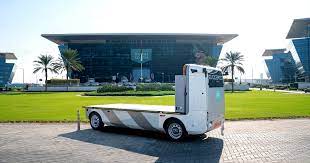The United Arab Emirates is preparing to launch driverless delivery vehicles within the next year, marking a major step forward in autonomous technology. The initiative is part of the country’s ongoing efforts to modernize logistics, increase efficiency, and support innovation across multiple sectors. Authorities say the deployment of these vehicles will enhance delivery services while reducing traffic congestion and operational costs.
Officials emphasized that driverless delivery technology is a key component of the UAE’s smart city and digital economy strategies. By integrating autonomous vehicles into the logistics network, companies can improve delivery speed, reduce human error, and optimize supply chains. The initiative is also aligned with global trends, where automation is transforming the way goods are transported and distributed.
The vehicles are expected to operate in urban and suburban areas, delivering goods directly to consumers and businesses. Equipped with advanced sensors, navigation systems, and AI-powered decision-making tools, the driverless vehicles can safely navigate complex traffic environments. Authorities have tested prototypes extensively to ensure compliance with safety standards and local regulations.
Experts note that autonomous delivery systems offer multiple advantages. They reduce reliance on human drivers, lower fuel consumption through optimized routes, and minimize operational costs. In addition, driverless vehicles can operate for longer hours, providing faster and more reliable deliveries to meet growing consumer demand.
The UAE government has collaborated with technology providers, logistics companies, and regulatory bodies to develop a legal and operational framework for driverless vehicles. This framework covers licensing, safety standards, insurance requirements, and traffic management, ensuring that autonomous operations are fully regulated. Authorities also plan to launch public awareness campaigns to familiarize citizens with the technology and address safety concerns.
Autonomous delivery vehicles are expected to support e-commerce growth in the UAE. Online shopping has surged in recent years, driving demand for faster and more flexible delivery solutions. By introducing driverless technology, the UAE aims to maintain high service standards, reduce delays, and meet the expectations of consumers and businesses alike.
The project also reflects the country’s commitment to sustainability and environmental responsibility. Driverless vehicles can be designed to use electric or hybrid power, lowering carbon emissions and contributing to national clean energy goals. Reduced traffic congestion from optimized deliveries will also help improve air quality in urban areas.
Analysts highlight that the introduction of driverless delivery vehicles can stimulate innovation across the logistics and technology sectors. Companies involved in AI, robotics, and transport engineering will have opportunities to develop solutions that enhance efficiency and safety. The UAE hopes to position itself as a regional leader in autonomous logistics and smart transport technologies.
Authorities confirm that full-scale deployment will begin after pilot programs and testing phases are successfully completed. Early operations will focus on controlled zones, gradually expanding to larger urban areas. Feedback from these pilots will guide further development and ensure that vehicles operate safely, efficiently, and reliably.
The UAE’s plan to launch driverless delivery vehicles within a year demonstrates its commitment to embracing cutting-edge technology. By combining innovation, safety, and efficiency, the initiative is set to transform logistics services and support the country’s vision of a smart, sustainable, and digitally advanced economy. The rollout will also provide valuable insights for future autonomous transport projects across the region.



